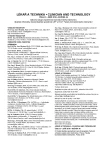-
Články
- Časopisy
- Kurzy
- Témy
- Kongresy
- Videa
- Podcasty
RESPIRATORY ARRHYTHMIA AS AN ENCOURAGEMENT OF INAPPROPRIATE ICD THERAPY
Implantable cardioverter-defibrillators (ICDs) are active cardiac implants for immediate treatment of ventricular arrhythmias. They provide life-saving therapy, but may also deliver inappropriate therapy. These two cases demonstrate a possibility of ICD therapy detection or induction encouraged by physiological patient breathing. The cases of 64-year-old and 30-year-old women patients are reported. The first one has received some therapy, the second one has not. The devices records did not show any abnormalities in trends or electrical parameters. As a solution, the detection parameters of the devices were optimized, with reference to individual physiologically reachable heart rates of the patients.
Keywords:
implantable cardioverter-defibrillator; respiration; inappropriate shock
Autoři: David Korpas 1; Jana Haluzikova 1; Marek Penhaker 2; Martin Augustynek 2
Působiště autorů: Institute of Nursing, Faculty of Public Policies, Silesian University, Opava, Czech Republic 1; Department of Cybernetics & Biomedical Engineering, Faculty of Electrical Engineering & Computer Science, Technical University Ostrava, Czech Republic 2
Vyšlo v časopise: Lékař a technika - Clinician and Technology No. 3, 2016, 46, 69-76
Kategorie: Původní práce
Souhrn
Implantable cardioverter-defibrillators (ICDs) are active cardiac implants for immediate treatment of ventricular arrhythmias. They provide life-saving therapy, but may also deliver inappropriate therapy. These two cases demonstrate a possibility of ICD therapy detection or induction encouraged by physiological patient breathing. The cases of 64-year-old and 30-year-old women patients are reported. The first one has received some therapy, the second one has not. The devices records did not show any abnormalities in trends or electrical parameters. As a solution, the detection parameters of the devices were optimized, with reference to individual physiologically reachable heart rates of the patients.
Keywords:
implantable cardioverter-defibrillator; respiration; inappropriate shock
Zdroje
[1] Yasuma, F.; Hayano, J.: Respiratory sinus arrhythmia: Why does the heartbeat synchronize with respiratory rhythm?. Chest, 2004, vol. 125, no. 2, 683–690.
[2] Soundarraj, D.; Thakur, R.K.; Gardiner, J.C.; Khasnis, A.; Jongnarangsin, K.: Inappropriate ICD Therapy: Does Device Configuration Make a Difference. Pacing and Clinical Electrophysiology, 2006, vol. 29, no. 8, p. 810–815.
[3] Santos, K.R.; Adragão, P.; Cavaco, D.; Morgado, F.B.; Candeias, R.; Lima, S.; Silva, J.A.: Diaphragmatic myopotential oversensing in pacemaker-dependent patients with CRT-D devices, Europace, 2008, vol. 10, no. 12, p. 1381–1386.
[4] Swerdlow, C.D.; Sachanandani, H.; Gunderson, B.D.; Ousdigian, K.T.; Hjelle, M.; Ellenbogen, K.A.: Preventing overdiagnosis of implantable cardioverter-defibrillator lead fractures using device diagnostics. J Am Coll Cardiol, 2011, vol. 57, no. 23, p. 2330–2339.
[5] Kossaify, A.: Implantable Cardioverter Defibrillator and Inappropriate Therapy: “Black Box” Examination Yielded Both Human and Technical Causes. Clin Med Insights Case Rep, 2013, vol. 2, no. 6, p. 183–187.
[6] Schulz, S.M.; Massa, C.; Grzbiela, A.; Dengler, W.; Wiedemann G.; Pauli, P.: Implantable cardioverter defibrillator shocks are prospective predictors of anxiety. Heart Lung, 2013, vol. 42, no. 2, p. 105–111.
[7] Alaiti, M.A.; Maroo, A.; Edel, T.B.: Troponin levels after cardiac electrophysiology procedures: review of the literature. Pacing Clin Electrophysiol, 2009, vol. 32, no. 6, p. 800–810.
[8] Theuns, D.A.; Rivero-Ayerza, M.; Goedhart, D.M.; Miltenburg, M.; Jordaens, L.J.: Morphology discrimination in implantable cardioverter-defibrillators: consistency of template match percentage during atrial tachyarrhythmias at different heart rates. Europace, 2008, vol. 10, no. 9, p. 1060–1066.
[9] Biffi, M.: ICD programming. Indian Heart Journal, 2014, vol. 66, no. Suppl 1, p. S88–S100.
Štítky
Biomedicína
Článok vyšiel v časopiseLékař a technika

2016 Číslo 3
Najčítanejšie v tomto čísle- VYUŽITIE MULTIPLEXNEJ RT PCR V DIAGNOSTIKE MIKROBIONÁLNYCH PATOGÉNOV
- ANTIBACTERIAL ACTIVITY OF TITANIUM DIOXIDE AND AG-INCORPORATED DLC THIN FILMS
- RESPIRATORY ARRHYTHMIA AS AN ENCOURAGEMENT OF INAPPROPRIATE ICD THERAPY
Prihlásenie#ADS_BOTTOM_SCRIPTS#Zabudnuté hesloZadajte e-mailovú adresu, s ktorou ste vytvárali účet. Budú Vám na ňu zasielané informácie k nastaveniu nového hesla.
- Časopisy



